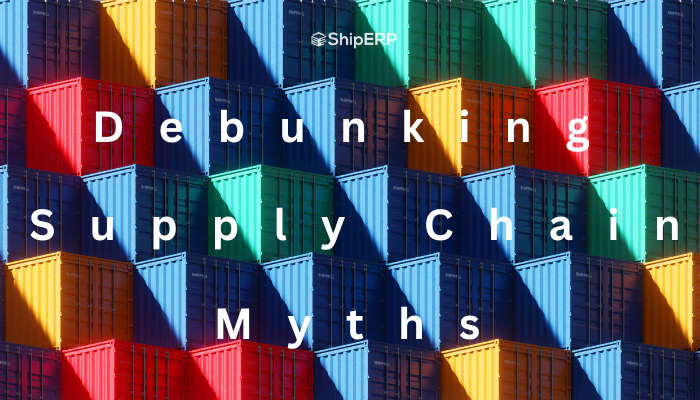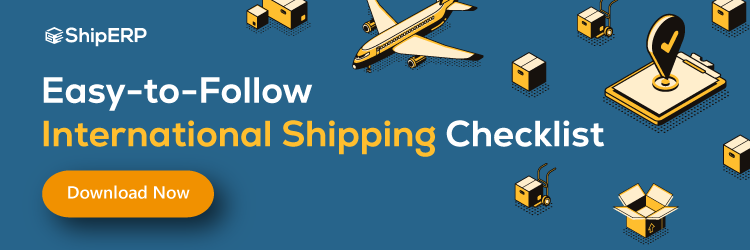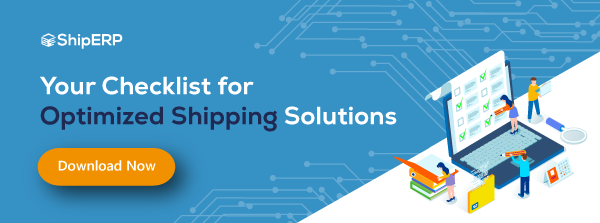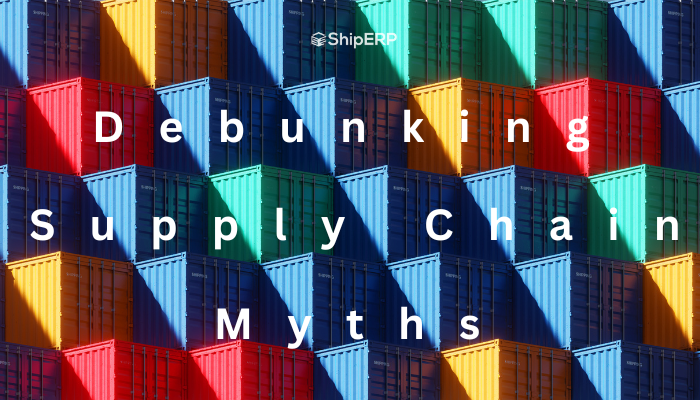
Fact or Fiction: Debunking Supply Chain Myths
The world of supply chain management is complex and often shrouded in mystery. It involves a multitude of processes and stakeholders working together to ensure the smooth flow of goods and services.
Unfortunately, this complexity has given rise to numerous myths and misconceptions about supply chain management. We’ll cut through the chatter and debunk five common supply chain myths, separating fact from fiction!
Myth 1: Supply chain management is all about logistics
One prevailing myth is that supply chain management is synonymous with logistics. Part of that misconception is a result of how the terms "logistics" and "supply chain" differ in their colloquial use between the United States and Europe. However, the two words are not exactly interchangeable.
The Facts: Supply chain has more moving parts than just logistics
While logistics plays a crucial role in supply chain management, it’s just one piece of the puzzle. Supply chain management encompasses a broader scope, including:
- Procurement
- Production planning
- Inventory management
- Demand forecasting
- Customer relationship management
It involves coordinating all activities from sourcing raw materials to delivering the final product to the end customer.
Myth 2: Supply chain management is all about cost reduction
Another widespread misconception is that the sole objective of supply chain management is cost reduction. Money makes the world go 'round, and while products that offer cost savings understandably lead with that benefit, cost efficiency is just one form of efficiency.
The Facts: Supply chain management balances cost reduction with other factors
In fact, while cost efficiency is certainly an important aspect, supply chain visibility ranked highest post COVID. Modern supply chain management focuses on achieving a balance between:
- Cost
- Quality
- Customer service
With many strategies at their disposal, companies aim to optimize their entire supply chain network, ensuring timely delivery, minimizing stockouts, meeting customer expectations, and managing costs effectively.

Myth 3: Supply chain management is only relevant for large corporations
Many people believe that supply chain management is only applicable to large corporations with extensive global operations. This belief can unfortunately result in companies struggling manually with inefficient and labor-intensive processes for longer than necessary.
The Facts: Supply chain management is relevant for all organizations/businesses
The principles of effective supply chain management can benefit organizations of all sizes. Even small businesses can improve their efficiency by implementing sound supply chain practices. Whether it's streamlining inventory management, reducing lead times, or enhancing supplier relationships, supply chain management is vital for any organization seeking operational excellence.
Myth 4: Supply chain management is a stand-alone function
Some mistakenly perceive supply chain management to be a standalone function or department within a firm. For companies who want to remain proactive and reduce ad-hoc firefighting, this couldn't be further from the truth.
The Facts: Supply chain management requires cross-functional coordination
In reality, it’s an integrative discipline that requires collaboration across various departments, including:
- Manufacturing
- Procurement
- Operations
- Finance
- Sales
- Marketing
- Customer service
- And potentially many more
Effective supply chain management requires cross-functional coordination and a holistic approach to align all activities toward common business goals.
Myth 5: Supply chain visibility is impossible to achieve
In the age of advanced technologies, achieving supply chain visibility is no longer an insurmountable challenge. Full supply chain visibility is only impossible in the minds of those who don't believe more nuanced data really helps their businesses.
The Facts: Implement technology to achieve supply chain visibility
With the advent of tools like real-time tracking, IoT sensors, and data analytics, organizations can gain unprecedented visibility into their supply chains. From tracking inventory levels to monitoring transportation routes, technology enables organizations to make actionable, data-driven decisions and respond quickly to disruptions or bottlenecks along the supply chain.
Debunk Supply Chain Myths with ShipERP
The experts at ShipERP have over 15 years of supply chain experience, and we can say with confidence that full supply chain visibility is possible because we've helped companies (both small and large) achieve that and more. To learn more about debunking these myths or to see it done for you, reach out to us at sales@erp-is.com!
ShipERP is dedicated to fostering digital supply chain transformations for companies, from privately held businesses to large, global enterprises. ShipERP's products provide sophisticated shipping management functionality to users of any ERP system, helping enterprises achieve more efficient shipping operations while reducing labor and freight costs. ShipERP Core and ShipERP Cloud are designed to fulfill business shipping requirements for parcel shipping.




